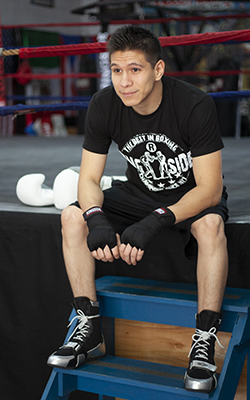
Giving thanks and practicing gratitude come naturally on Thanksgiving. These ideas are baked into the holiday’s identity.
But we don’t have to limit our practice of gratitude to just one day a year. We can engage in gratitude as a part of our daily lives, all year long. When we do, we gain more than we give.
For boxers and other athletes, learning to incorporate appreciation can do more than just give us a positive outlook in life. Regularly recognizing our own success and the role others play in it can actually improve performance in the ring.
What is Gratitude?
The expression of gratitude can come in many forms. It would be hard to list all the ways in which one could incorporate gratitude in a given day.
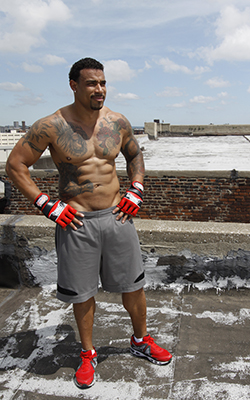
But, at its core, the concept of gratitude is very simple. Gratitude begins when you recognize the gains or wins you’ve experienced, especially when they are not obvious. Once you’ve taken that step, you need to then acknowledge the role that someone else played in creating that gain.
So gratitude consists of two related concepts. First, we have to see our wins, no matter how small. These wins don’t have to have come in the form of official competitive wins. We aren’t talking about record. Did you show up to training every day for the last week? Good for you! Did you step into the sparring ring for the first time? Count it!
Second, we have to acknowledge the role that others played in that win. Did a training partner motivate you to get to the gym every day? Did the hours of the gym change making it easier to work training into your schedule? Maybe someone gave you a ride.
Whoever or whatever helped you along your path, recognize that role. Understand that someone else played a role in your accomplishment. And then thank them for it, even it’s just a quiet thanks for the nice weather that encouraged you to get outside for a run.
How Will Gratitude Improve your Boxing?
Currently, in the fitness and self-improvement world, the notion of gratitude has become quite popular. But will it actually have an impact on your boxing performance? According to both scientific study and the stories of successful athletes, the answer is yes.
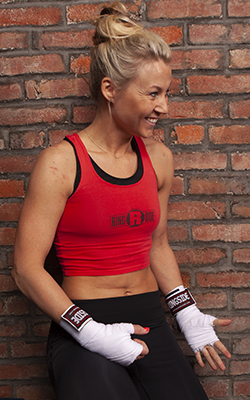
Athletes who regularly practice gratitude bounce back more quickly from injuries and other setbacks. Because a gratitude practice helps athletes better balance all of the demands on their time, they tend to take better care of their health. When nutrition and stress are properly managed, athletes become, overall, more resilient.
Regularly acknowledging one’s accomplishments leads to greater self-esteem. Because a practice of gratitude leads us to compare to our past selves, instead of some external ideal (or someone else’s victories), we end up liking ourselves more. A regular practice of gratitude will also help an athlete value their accomplishments, instead of constantly stressing about how much remains to be done.
In terms of more concrete impacts, the practice of gratitude can create measurable improvements to one’s physical health. Gratitude practice is associated with a drop in inflammatory markers, lower blood pressure, and improved sleep quality.
Improving any of these will have a direct impact on your performance in the gym or in the ring. It will foster a greater sense of community amongst you and your peers and coaches at the gym. And it will allow you to achieve greater, than taking a more self-critical approach might.
Ways to Practice Gratitude
Knowing that gratitude is valuable, how do you put it to work? It can be hard to express gratitude for the things we experience as a part of our daily lives (like a parent’s support, a spouse’s cooking or cleaning, or a training partner who always shows up).
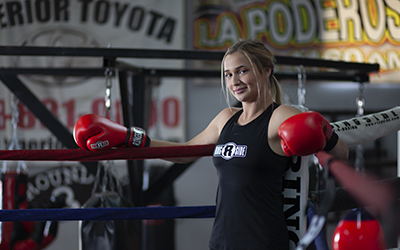
In order to make gratitude a part of your daily life, you have to focus on the practice of gratitude and do it on a regular basis. Just like building strength or learning a combination, you must practice it over and over again. Incorporate it into your routine alongside your morning run and your good nutrition habits.
To help you begin your gratitude journey, here are four ways that you can begin practicing gratitude right now.
1. Start a gratitude journal.
It sounds silly, but a gratitude journal really does help you become better at expressing thanks. The goal would be to list three to five things, at least once a week, that you feel grateful for. Make sure to acknowledge the people and things that helped you along the way.
2. Do something thoughtful for a friend or family member.
Think of something that they would appreciate. Leave them a note that acknowledges, in a specific way, how they have been helpful to you.
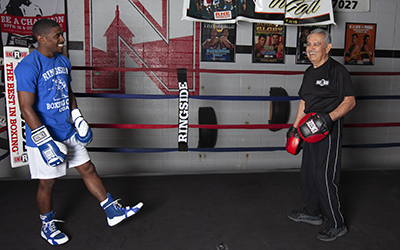
3. Reach out to someone who has helped you in the past.
Think about a coach that helped you when you first started out. Maybe there’s a friend you haven’t spoken to in a while. What about the person from the gym who held the mitts for you last week?
Write this person a letter expressing your appreciation for their help. And then give the letter to that person.
4. Thank someone immediately after a success.
When you have a win, whether it’s in the ring or in the gym, go and thank someone. Find the person who helped you build the stamina to do a full four rounds of full speed bag work. Tell them thank you. Thank the coach who helped you nail the combination you were struggling with.
And it doesn’t have to be one person. If two or three people come to mind, thank them all.
Conclusion
However you choose to express your gratitude, plan to make it a part of your regular routine. If physical training and proper nutrition form two legs of a fighter’s successful development, then mental health forms the third. A regular gratitude practice can be the basis for strong mental health. Tie it directly into your development plan, and treat it with the same respect as you would your time on the heavy bag.
Sign up for our Email Newsletter
Learn about all of our great deals and get alerts when we post new content like this.


Good pep talk. Gratitude works